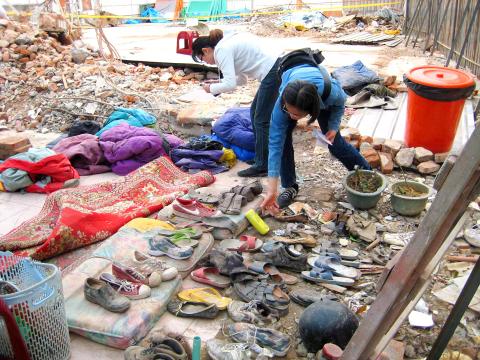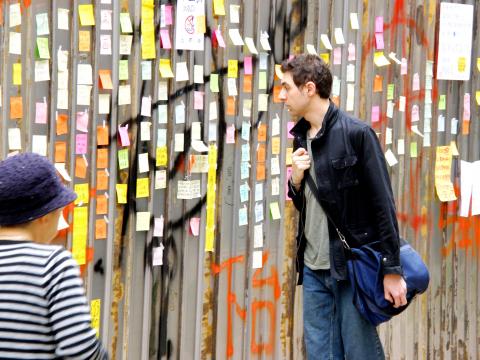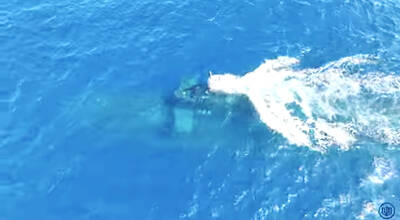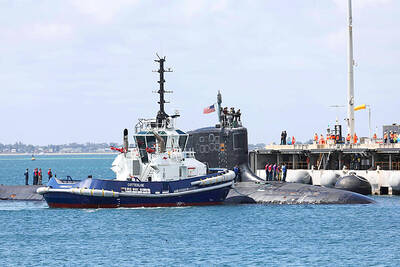Several student groups have mobilized following the demolition last week of the Wang (王) family residences for an urban renewal project in Taipei, camping out on the site and calling for a stop to all construction work, amendments to the Urban Renewal Act (都市更新條例) and the rebuilding of the Wangs’ homes.
The Wangs lived in two houses on a plot of land in Shilin District (士林) that a construction firm was eyeing for a 15-story apartment. Although the Wangs had refused to sell their properties, the construction firm, having obtained the consent of 95 percent of the landowners on the block, asked the city government to evict the family.
Students have set up tents and a makeshift station at the site of the Wangs’ former residence, with posters and slogans such as “Buy a house at 40 and see it demolished at 70” lining the makeshift walls.

Photo: Huang Chi-hao, Taipei Times
Although the construction site has been walled off, an opening remains, giving protesters and the Wang family access to the worksite.
Liu Hsiao-hsin (劉曉欣), a fine arts student from National Taiwan Normal University who has slept at the site for eight days, said it was shocking to see the government use its administrative power to demolish a residence that would take most people a lifetime to buy.
“A lot of people came out and supported our actions, but they couldn’t stay because they have jobs and have to support their families,” said Liu, who had also participated in recent rallies in support of the rights of workers, farmers and minority groups.

Photo: Yao Yueh-hung, Taipei Times
A professor from the sociology department at an unnamed university said that any student who came out in support of the Wangs would get an extra 90 points on their mid-terms, which were held on Friday, two days after the demolition.
“I hope that other students who came to support the Wangs receive as much support from their professors,” Liu said, adding that “justice and equality are what I believe in and I will continue to fight for them.”
Liu said that prior to the demolition, she and other supporters had slept on the floor of the Wangs’ house, but they have since relocated and were now sleeping beneath the MRT line.
Hsien Yi-ting (謝邑霆), a law student from National Taipei University, said although he was studying law, he learned through the Wang incident that “administering by the law” is not always correct.
If the law goes against the Constitution, the power which that law confers should be annulled, Hsieh said.
An architecture student surnamed Shen (沈) from National Cheng Kung University in Greater Tainan said he had packed his bags and headed north after seeing protesting students evicted from the Wang house by police on TV.
“Being here and supporting the Wangs is more important than staying in school and going to classes,” Shen said.
Yang Yu-ting (楊語停), a self-proclaimed xiangmin, or “Internet forum poster,” said that on Thursday, the day of the demolition, the sight of police officers wielding batons and shields and treating students like captives from the enemy camp was worse than what he thought the Chinese Communist Party would do.
Yang said she had traveled to Taipei four times from Hsinchu to film the incident and post it online so that more netizens would see “what a horrible thing” the Taipei City Government had done to the Wang family.
Yao Kuai (妖怪), a second-year high-school student, not only spray-painted the excavators while they were being moved into position, but also sang a self-composed song titled Caretakers of the People, mocking the police for picking on people and accusing the government of corruption.
Professors from National Chengchi University (NCCU), Shih Hsin University, National Taiwan University of Arts, Taipei National University of the Arts, Soochow University and Tunghai University have also appeared at the Wang family site to express their thoughts.
Some have even relocated classes to the site “so that students could debate” the issue.
Students from National Tamkang University, Fu Jen Catholic University, National Taiwan University and NCCU have also mobilized to support the Wangs.
Human rights lawyer Chiu Huang-chuan (邱晃泉), who had visited the site, said protesters were not affiliated with any political party or corporate interests.
A 61 year-old participant named Lee Chun-chung (李俊崇) said that “autocratic governments fear student activities the most, because they are the one group that has no interests, and is the hardest to defame.”
Translated by Jake Chung, Staff writer

CSBC Corp, Taiwan (台灣國際造船) yesterday released the first video documenting the submerged sea trials of Taiwan’s indigenous defense submarine prototype, the Hai Kun (海鯤), or Narwhal, showing underwater navigation and the launch of countermeasures. The footage shows the vessel’s first dive, steering and control system tests, and the raising and lowering of the periscope and antenna masts. It offered a rare look at the progress in the submarine’s sea acceptance tests. The Hai Kun carried out its first shallow-water diving trial late last month and has since completed four submerged tests, CSBC said. The newly released video compiles images recorded from Jan. 29 to

DETERRENCE EFFORTS: Washington and partners hope demonstrations of force would convince Beijing that military action against Taiwan would carry high costs The US is considering using HMAS Stirling in Western Australia as a forward base to strengthen its naval posture in a potential conflict with China, particularly over Taiwan, the Wall Street Journal reported on Saturday. As part of its Indo-Pacific strategy, Washington plans to deploy up to four nuclear-powered submarines at Stirling starting in 2027, providing a base near potential hot spots such as Taiwan and the South China Sea. The move also aims to enhance military integration with Pacific allies under the Australia-UK-US trilateral security partnership, the report said. Currently, US submarines operate from Guam, but the island could

RESTRAINTS: Should China’s actions pose any threat to Taiwan’s security, economic or social systems, China would be excluded from major financial institutions, the bill says The US House of Representatives on Monday passed the PROTECT Taiwan Act, which states that Washington would exclude China from participating in major global financial organizations if its actions directly threaten Taiwan’s security. The bill, proposed by Republican Representative Frank Lucas, passed with 395 votes in favor and two against. It stipulates that if China’s actions pose any threat to Taiwan’s security, economic or social systems, the US would, “to the maximum extent practicable,” exclude Beijing from international financial institutions, including the G20, the Bank for International Settlements and the Financial Stability Board. The bill makes it clear that China must be prepared

Taiwanese trade negotiators told Washington that Taipei would not relocate 40 percent of its semiconductor production to the US, and that its most advanced technologies would remain in the nation, Vice Premier Cheng Li-chiun (鄭麗君) said on Sunday. “I told the US side very clearly — that’s impossible,” Cheng, who led the negotiation team, said in an interview that aired on Sunday night on Chinese Television System. Cheng was referring to remarks last month by US Secretary of Commerce Howard Lutnick, in which he said his goal was to bring 40 percent of Taiwan’s chip supply chain to the US Taiwan’s almost